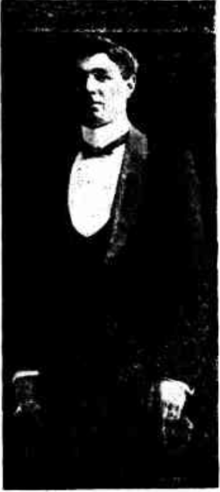Bert Rache (1876-1928)[1] born Joseph Bernard Rash, was an Australian composer,[2] music director, conductor, pianist, company leader.[3]
Bert Rache | |
|---|---|
 Bert Rache | |
| Background information | |
| Born | Lismore, New South Wales, Australia |
| Died | 30 August 1928 |
| Occupation(s) | Composer, conductor, producer |
| Years active | 1890–1920 |
Bert Rache grew up in Lismore, New South Wales, and began his career as a musician in the late 1890s. After touring as George Rignold's orchestra leader, he was employed as a pianist with Harry Rickards in 1903 (continuing this association for many years). His early career also saw him associated with Perth's Palace Gardens (1904–06) and King's Theatre (c. 1909). Rache was in much demand as a music director/composer and arranger throughout the 1910s and 1920s and toured his own troupes at various times, including the Imperial Orchestra and Th' Drolls.[4]
Works
edit- 1906 Imperial Intermezzo
- 1906 Dance of the Rosebuds
- 1907 Tivoli Mazurka
- 1908 We of the Southern Cross March
- 1910 Besses o' the barn march
- 1911 Take me back to Bendigo
- 1910 The Rivals Waltz
- 1912 suite of works for pantomime 'Aladin' including Forty Thieves two step and Sinbad waltz
- 1912 Silvery Moon Schottische
- 19212 Surfer's Two Step (arrangement)
- 1912 Confetti waltz / by Bert Rache
- 1915 Suite of works for musical play entitled 'Come Over Here'
- 1916 Suite of works for pantomime 'Puss in Boots'
- 1907 Daughter of Australia [5] for a stage production of The Squatter's Daughter (play), later a successful silent global film.
- 1921 Golden Days
- Buckle Up - One Step novelty
- I've made up my mind to leave my dear old home.
- To live in the light od your eyes
- I never knew I loved you, till you said goodbye
- Chants and Choruses [for the] Royal Antediluvian Order of Buffaloes [printed by] Syd. Day, Ltd.
Americana Faux
editBert Rache published a few fake American songs, presumably to capture audience enthusiasm for imported exotica, or accompaniment of American stage productions.
- 1913 On the Mississippi
- 1910 I'm going back to Dixie - two step
- 1909 Way down on the old Swanee (arrangement)
Recordings
editA recording of a topical patriotic song 'Soldier Sentry of the Deep' is in circulation, celebrating the triumphant return of HMS New Zealand from the great war.
A gramophone recording exists of patriotic march 'They Were There (There, There)' with lyrics by War Hero Harley Cohen vocals by Foster Richardson, thirteenth item [1]
References
edit- ^ "Family Notices". The Sydney Morning Herald. No. 28, 287. New South Wales, Australia. 1 September 1928. p. 15. Retrieved 25 April 2021 – via National Library of Australia.
- ^ ""Dreaming of You"". The Sydney Stock and Station Journal. Vol. XX, no. 22. New South Wales, Australia. 19 June 1908. p. 2. Retrieved 25 April 2021 – via National Library of Australia.
- ^ "A New March". Northern Star. Vol. 33. New South Wales, Australia. 27 July 1908. p. 2. Retrieved 25 April 2021 – via National Library of Australia.
- ^ "Amusements". The Daily Express. Vol. 2, no. 554. New South Wales, Australia. 17 February 1921. p. 2. Retrieved 25 April 2021 – via National Library of Australia.
- ^ Rache, Bert; Morley, Arthur, A daughter of Australia [music] / words by Arthur Morley ; music by Bert Rache, J. Albert & Son
